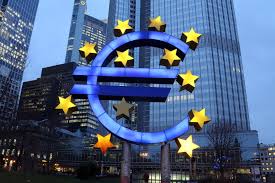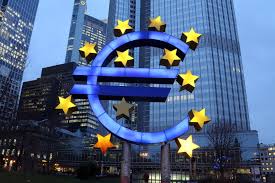
Following its confidence that there has been significant progress made for achieving a sustained adjustment in inflation in eurozone and one which is also sustainable, the European Central Bank (ECB) announced its decision to completely end its huge asset purchase program that was a part of the crisis-era stimulus strategy, by the end of this year.
The bank announced that it would reduce by half its monthly net asset purchase to teach 15 billion euros (17.4 billion U.S. dollars) starting in October this year and stop it completely by December.
This however will be dependent on data that would be able to make sure that the medium-term inflation outlook of the ECB is accurate, said the statement that was released after a Governing Council meeting of the ECB.
At the same time, the central bank of Europe anticipates a steadiness in the benchmark deposit interest rates for the euro area at its current levels till at least through the summer of 2019.
ECB President Mario Draghi told press that the Governing Council had not discussed the issue of timing to raise rates in its most recent meeting despite the infrequent explicit indications of rate changes in the forward guidance issued by the ECB.
"The intention of our interest rate formulation is to give it a time dimension, but not a precise one," Draghi said.
"Significant monetary policy stimulus is still needed to support the further build-up of domestic price pressures and headline inflation developments over the medium term," Draghi stressed.
The aim of the ECB is to make sue the existence of ample degree of monetary easing for an extended period of time given the sizeable stock of acquired assets that is worth 2.4 trillion euros as of May of this year and coupled with reinvestments of the principal payments from maturing securities that were bought following the end of asset purchase program and the forward guidance on interest rates.
Draghi said that asset purchase program is a normal instrument of monetary policy and is not set to disappear.
"There is the collective intention of the Governing Council to avoid any unwarranted tightening of financial conditions," he added, confirming that the decision was made unanimously.
The euro has been impacted by the more dovish stance of the ECB in general even as the U.S. Federal Reserve has taken a more hawkish strategy on monetary policy. This is reflected in the 1.8 percent drop ion the value of the euro against the U.S. dollar since noon of Thursday.
According to the ECB, the growth rate of the euro area was revised for 2018 at 2.1 per cent while the growth rates expected for 2019 and 2020 were also brought down at 1.9 per cent and 1.7 per cent respectively.
"Uncertainties related to global factors, including the threat of increased protectionism, have become more prominent," Draghi emphasized, adding that the risk of persistent heightened financial market volatility should be closely monitored.
(Source:www.xinhuanet.com)
The bank announced that it would reduce by half its monthly net asset purchase to teach 15 billion euros (17.4 billion U.S. dollars) starting in October this year and stop it completely by December.
This however will be dependent on data that would be able to make sure that the medium-term inflation outlook of the ECB is accurate, said the statement that was released after a Governing Council meeting of the ECB.
At the same time, the central bank of Europe anticipates a steadiness in the benchmark deposit interest rates for the euro area at its current levels till at least through the summer of 2019.
ECB President Mario Draghi told press that the Governing Council had not discussed the issue of timing to raise rates in its most recent meeting despite the infrequent explicit indications of rate changes in the forward guidance issued by the ECB.
"The intention of our interest rate formulation is to give it a time dimension, but not a precise one," Draghi said.
"Significant monetary policy stimulus is still needed to support the further build-up of domestic price pressures and headline inflation developments over the medium term," Draghi stressed.
The aim of the ECB is to make sue the existence of ample degree of monetary easing for an extended period of time given the sizeable stock of acquired assets that is worth 2.4 trillion euros as of May of this year and coupled with reinvestments of the principal payments from maturing securities that were bought following the end of asset purchase program and the forward guidance on interest rates.
Draghi said that asset purchase program is a normal instrument of monetary policy and is not set to disappear.
"There is the collective intention of the Governing Council to avoid any unwarranted tightening of financial conditions," he added, confirming that the decision was made unanimously.
The euro has been impacted by the more dovish stance of the ECB in general even as the U.S. Federal Reserve has taken a more hawkish strategy on monetary policy. This is reflected in the 1.8 percent drop ion the value of the euro against the U.S. dollar since noon of Thursday.
According to the ECB, the growth rate of the euro area was revised for 2018 at 2.1 per cent while the growth rates expected for 2019 and 2020 were also brought down at 1.9 per cent and 1.7 per cent respectively.
"Uncertainties related to global factors, including the threat of increased protectionism, have become more prominent," Draghi emphasized, adding that the risk of persistent heightened financial market volatility should be closely monitored.
(Source:www.xinhuanet.com)














